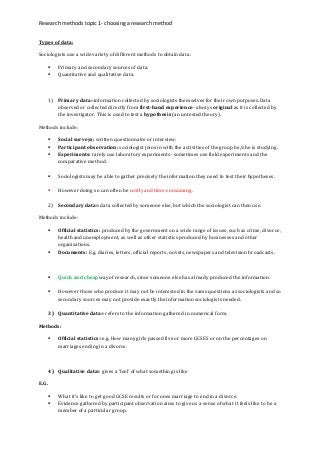
Research methods topic 1 choosing a research method
- 1. Research methods topic 1- choosing a research method Types of data: Sociologists use a wide variety of different methods to obtain data: Primary and secondary sources of data. Quantitative and qualitative data. 1) Primary data=information collected by sociologists themselves for their own purposes.Data observed or collected directly from first-hand experience- always original as it is collected by the investigator. This is used to test a hypothesis (an untested theory). Methods include: Social surveys: written questionnaire or interview. Participant observation: sociologist joins in with the activities of the group he/she is studying. Experiments: rarely use laboratory experiments- sometimes use field experiments and the comparative method. Sociologists may be able to gather precisely the information they need to test their hypotheses. However doing so can often be costly and time-consuming. 2) Secondary data= data collected by someone else, but which the sociologist can then use. Methods include: Official statistics: produced by the government on a wide range of issues, such as crime, divorce, health and unemployment, as well as other statistics produced by businesses and other organisations. Documents: E.g. diaries, letters, official reports, novels, newspapers and television broadcasts. Quick and cheapway of research, since someone else has already produced the information. However those who produce it may not be interested in the same questions as sociologists and so secondary sources may not provide exactly the information sociologists needed. 3) Quantitative data= refers to the information gathered in numerical form. Methods: Official statistics=e.g. How many girls passed five or more GCSES or on the percentages on marriages ending in a divorce. 4) Qualitative data= gives a ‘feel’ of what something is like E.G. What it’s like to get good GCSE results or for ones marriage to end in a divorce. Evidence gathered by participant observation aims to give us a sense of what it feels like to be a member of a particular group.
- 2. Research methods topic 1- choosing a research method In depth interviews- gives insight into other persons shoes This method produces rich descriptions of people’s feelings and experiences. Quantitative data Qualitative data Primary sources Questionnaires, structured Participant observation, interviews. unstructured interviews. Secondary sources Official statistics Letters, newspapers, articles.
- 3. Research methods topic 1- choosing a research method Factors influencing choices of methods: PERVERT 1) practical issues: Time and money Personal skills and characteristicse.g. participant observation requires the ability to mix easily with other people as well as good powers of observations. Amount of people Funding bodies Subject matter- it may be harder to study a particular group or subject by one method than by another. E.g. harder for a male to study an all-female group by means of participant observation. 2) Ethical issues= moral issues of right and wrong. Informed consent- should have the right to refuse Privacy and confidentiality- should keep the identity of research participants secret in order to help to prevent possible negative effects. They should also respect the privacy of research participants. Vulnerable groups- special care should be taken to those who are vulnerable e.g. because of their age, disability. Effects on research participants- harmful effects e.g. psychological. Researchers should prevent this. Covert research- when researcher’s identity and research purpose is hidden from the people being studied. This creates ethical problems, such as deceiving or lying to people in order to gain informed consent. 3) Theoretical issues=refers to the questions of what we think society is like and whether we can obtain an accurate, truthful picture of it. Validity= true, genuine picture of topic being studied- allows the researcher to get closer to the truth. E.g. qualitative methods- participant observation gives us a more valid, truthful account of what it is like to be a member of a group.
- 4. Research methods topic 1- choosing a research method Reliability= when repeated- same results obtained. E.g.quantitative data- written questionnaires. Representativeness= whether or not the people we study are a typical cross- section of the group we are interested in. Sample- ensure its representative of typical of the wider population, we can then use findings to make generalisations. Large scale quantitative surveys-more likely to produce representative data. Methodological perspective: Sociologists choice of method is also influenced by their methodological perspective- their view of society and how we should study it. There are two contrasting perspectives on the choice of methods: Positivists Interpretivists Positivists: Quantitative data Seek to discover patterns of behaviour Sociology= science Interpretivists: Qualitative data Seek to understand social actors meanings Sociology= not a science Functionalists and Marxists often take a positivist approach. They see society as a large scale structure that shapes our behaviour. Interactionists favour an interpretivists approach. They see society on a micro level of society- focussing on small scale- face to face interactions. The sociologist’s theoretical perspective is usually the most important factor when choosing a research method. Whenever possible, they will want to obtain the type of data- quantitative or qualitative – that their perspective views as most appropriate. However practical and ethical factors usually limit the choice of method. Time, resources, access, consent, privacy- restrictions of their choice. Choice of topic:
- 5. Research methods topic 1- choosing a research method 1) Theoretical perspective: 2) Society’s values:Sociologists are influenced by society’s values. As society’s values change over time so does the focus of research. 3) Funding bodies: Most research requires funding from an external body e.g. government agencies. As the funding body is paying for the research, it will determine the topic to be investigated. E.g. one of the major concerns of new labour governments after 1997 was the ‘social exclusion of some disadvantaged groups. As a result, government departments were keen to fund research projects to investigate the causes and effects of social exclusion. 4) Practical factors: e.g. inaccessibility of certain situations may also restrict which subjects they study e.g. male participating in an all-female group (participant observation )